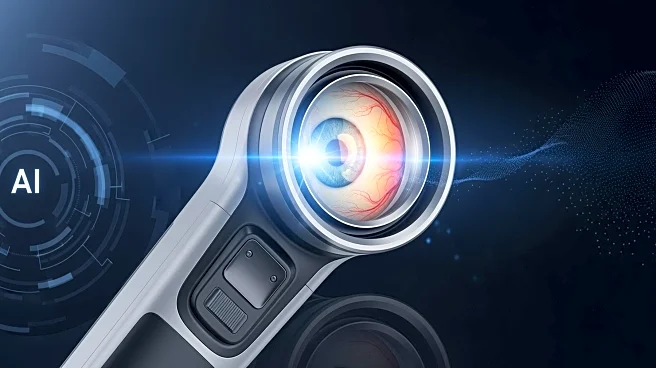What's Happening?
A new AI-powered device has been developed to enhance the diagnosis of eye diseases using fundus images. This portable diagnostic tool integrates low-cost imaging hardware with advanced software to detect
conditions such as diabetic retinopathy, glaucoma, and age-related macular degeneration. The device utilizes the EfficientNet-B0 model, a deep learning algorithm pre-trained on ImageNet, to analyze high-resolution fundus images captured by a Raspberry Pi camera module. The system is designed to be user-friendly, featuring a touch screen for displaying diagnostic results and connectivity options for remote data transfer. The device aims to provide accurate and reliable diagnoses, particularly in resource-constrained settings.
Why It's Important?
This development is significant as it addresses the challenge of providing accessible and accurate eye disease diagnostics in low-resource environments. By integrating hardware and software into a single portable system, the device offers a cost-effective solution for early detection and treatment of eye conditions, potentially reducing the risk of blindness. The use of AI in healthcare is expanding, and this device exemplifies how technology can improve diagnostic accuracy and efficiency. It also highlights the potential for AI to bridge gaps in healthcare access, particularly in underserved regions, by enabling remote diagnostics and reducing the need for specialized personnel.
What's Next?
The next steps involve further testing and validation of the device in clinical settings to ensure its reliability and effectiveness. There may be interest from healthcare providers and organizations in adopting this technology to enhance their diagnostic capabilities. Additionally, the developers might explore partnerships with medical institutions to facilitate widespread deployment. As the device gains traction, it could lead to advancements in other areas of medical imaging and diagnostics, encouraging further innovation in AI-driven healthcare solutions.
Beyond the Headlines
The integration of AI in medical diagnostics raises important ethical and regulatory considerations. Ensuring patient data privacy and addressing potential biases in AI algorithms are critical to maintaining trust in these technologies. Moreover, the success of such devices could influence healthcare policy, prompting discussions on the role of AI in public health and the need for updated regulatory frameworks to accommodate new technologies.










